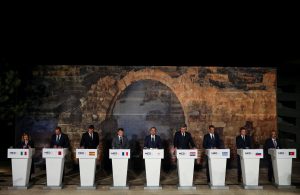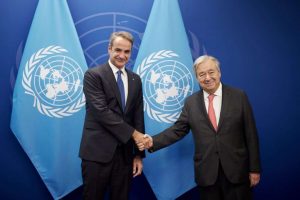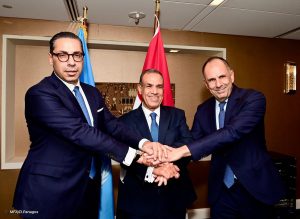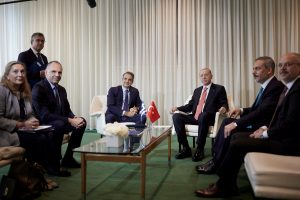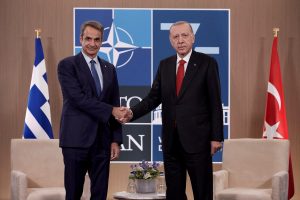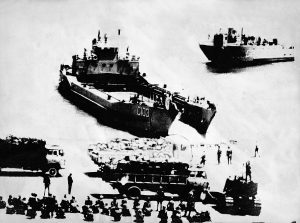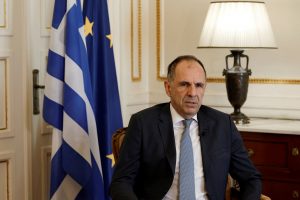An informal three-way meeting yesterday at UN headquarters in New York between Cyprus’s President Nikos Christodoulides, Turkish Cypriot leader Ersin Tatar, and UN Secretary General Antonio Guterres, was held with very low expectations, as Tatar on the eve of the discussions declared he will not enter into full-fledged talks unless the Greek side first recognizes the sovereignty of the Turkish-occupied territories – a demand rejected by the UN and all international players.
This comes as no surprise, as Turkish President Recep Tayyip Erdogan has for years called for a two-state solution, most recently in his speech to the United Nations General Αssembly. Turkish Cypriot leaders have always followed Ankara’s line historically.
Ankara’s calls took on a greater intensity and urgency after extremely large gas deposits were discovered off the coast of the island. Erdogan wants to split the profits.
As the sole legitimate, internationally recognized state authority on the island, the Republic of Cyprus licensed oil and gas giants such as Exxon Mobil and Italy’s Eni to drill.
Ankara’s vehement response, including military threats, put a damper on the whole process and, meanwhile, Erdogan licensed Turkish Petroleum (TPAO) to drill off the northern coast of the island.
This wealth will certainly be high on the Turkish agenda if settlement negotiations between the two sides begin in earnest.
The mainstream Cyprus daily Phileleftheros reported yesterday that Guterres was to table a two-phase plan. In the first phase, the two leaders would conduct a series of intensive talks, starting with the issue of internal governance. That would be followed by talks including the leaders of the three “Guarantor Powers” – Greece, Turkey and the UK (which maintains two sovereign bases on Cyprus and has always played a crucial role in previous talks and plans).
The guarantor powers were established as a unique system to guarantee the status on the island if it were to change from either side. Cyprus was a British Crown colony until it was granted independence in 1960, when the Republic of Cyprus was established.
50 years of failed talks and the international framework for a solution
For fifty years Cypriot and Greek governments have struggled to solve the problem of the continuing occupation of Cyprus, based on international law and under the auspices of the United Nations, which has issued countless resolutions condemning the occupation of a sovereign state.
Ever since the mid-1970s, the framework of a solution has been the establishment of a bi-zonal, bi-communal federation that would keep the Turkish Cypriots in the north and the Greek-Cypriots in the south, entail a return of a chunk of the occupied territories to the Greek Cypriots, and include an agreement on an exchange or compensation for properties lost in the 1974 invasion.
Before its adamant demands for a two-state solution, Ankara’s stance pointed to a very loose confederation which would grant a large measure of sovereignty to the occupied north.
If an agreement were to be reached today, that would most likely be its parameters
The UN framework, on the other hand, provides for a state with a single citizenship and a single international personality. It would also provide for the withdrawal of the vast majority of the 40,000 Turkish troops from the occupied territories.
It has been supported for decades by the US, the UK, the European Union, and individually by EU member states like Germany and France.
Cyprus’s EU accession and the Annan Plan
Cyprus’s 2004 EU Accession treaty (Protocol 10) stipulates that the whole of Cyprus is admitted to the Union, but that the EU acquis (laws and regulations) will be suspended in the north pending a solution.
Before the accession, a “reunification” plan (crafted by then UN Secretary General Kofi Annan, whose name it bears, and his Special Advisor Alvaro de Soto) would have created two constituent states, a presidential council and from its ranks a rotating Greek Cypriot-Turkish Cypriot presidency, a bicameral legislature and a Supreme Court that would include an equal number of Greek Cypriots and Turkish Cypriots, as well as three foreign judges, an international first for a sovereign state.
The plan was supported by 65% of Turkish Cypriots, but only 24% of Greek Cypriots, who were strongly urged by then president Tassos Papadopoulos, in an emotionally charged, televised national address, to reject it.
The overarching concern of the Greek Cypriots was that the plan would give Ankara and the Turkish Cypriots a significant influence over affairs in their constituent state.
Ankara and the Turkish Cypriot leadership severely criticized the Greek Cypriots and their leadership, charging that they were to blame for the failure of the plan and that they did not truly want a solution.
At the time, Greek Prime Minister Kostas Karamanlis adopted a neutral stance, and avoided putting any pressure on Papadopoulos, effectively acquiescing to the Cypriot president’s rejection of the plan. The two countries have most often worked closely together in efforts toward a solution.
The failed Crans Montana negotiations
In July, 2017, just four months after Guterres began his first term as UN Secretary General, and after two years of prior negotiations, settlement talks held in Crans-Montana, Switzerland crashed.
There were high expectations for these talks, as the left-wing leader of the Turkish Cypriots had throughout his career been a staunch supporter of a rapprochement and settlement. They were viewed as the last, best chance for a solution. But Ankara calls the shots in the north.
The key reasons for the collapse were that Ankara refused to withdraw its troops from Cyprus and insisted that it maintain a unilateral right to intervene under the antiquated, colonial era Treaty of Guarantee, terms the Greek side said it could not accept for a sovereign 21st century state that is also an EU member.
Guterres did not hide his strong disappointment, and he too said the withdrawal of Turkish troops was a pivotal issue.
“I wish the next generation good luck on this and that one day maybe Turkish Cypriots and Greek Cypriots will decide together that there is no longer a need for troops on the island,” he declared.
Seven years later, he is back to the drawing board, in what may well be the UN’s last ditch effort to reach a settlement.
